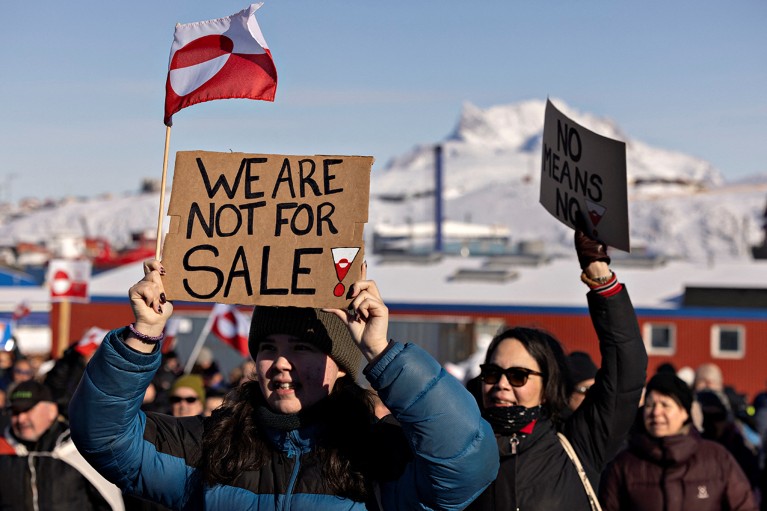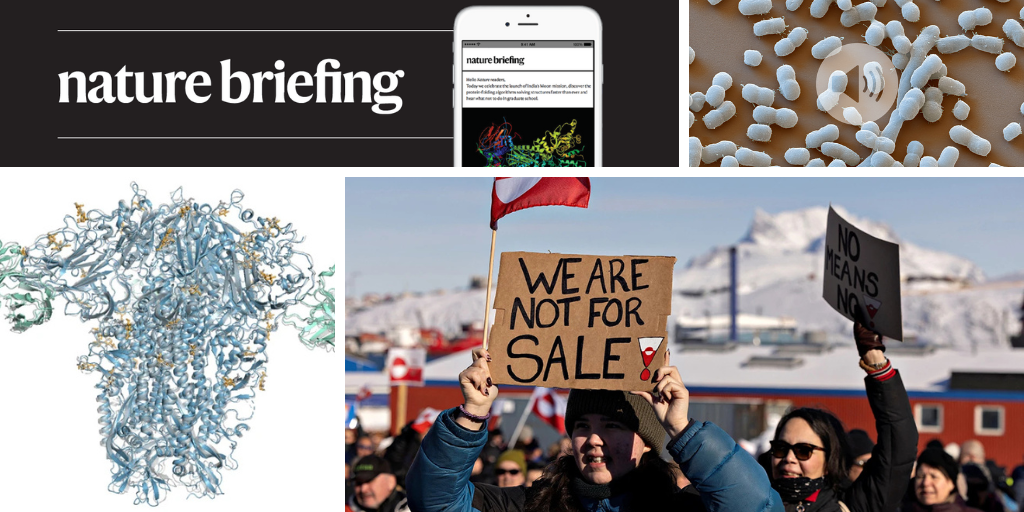You have full access to this article via your institution.
Hello Nature readers, would you like to get this Briefing in your inbox free every day? Sign up here.

Protesters in Nuuk, Greenland, show their opposition to US President Donald Trump’s designs on the island.Credit: Christian Klindt Soelbeck/Ritzau Scanpix via Reuters
Tension is rising in Arctic science because of US President Donald Trump’s threats to somehow take over Greenland. At a conference in Colorado earlier this week, some attendees protested in support of the autonomous, self-governing territory of Denmark. “We’ve had very good relationships with Greenland, they’ve had a real interest in working with the US — and these offensive and inappropriate actions have been really destructive,” says a US scientist who has worked in Greenland for nearly two decades and who requested anonymity for fear of reprisal.
AlphaFold3 — the latest version of the Nobel-prizewinning protein-structure prediction tool — can model the interaction of proteins with other molecules, including drugs. But the data underpinning the tool lacks examples of these interactions, which scientists say is holding it back. Now a consortium of leading pharmaceutical companies have announced plans to make their own AlphaFold-inspired AI model using the thousands of protein structures they have locked away in their vaults. The model will be based on an open-source reproduction of AlphaFold, but there are no plans to make it available beyond member companies.
A study of families who have lived through conflict in Syria suggests that genetic imprints of their trauma have been passed to their children and grandchildren. Adults and children who had been directly exposed to violence in the 1980s and after 2011 had distinctive epigenetic marks — small chemical tweaks that don’t affect the DNA sequence — on certain genes. In the case of one woman who had witnessed violence in the 1980s, these tags persisted in her daughter and grandchildren. The mechanism for such inheritance is unknown, and the idea itself is hotly debated among scientists. “All of these marks, almost all of them, are erased when the eggs hit the sperm,” says epigeneticist Michael Kobor. “The biology just doesn’t support DNA methylation as a vehicle of intergenerational transmission.”
Reference: Scientific Reports paper
Features & opinion
Climate-driven disasters are driving up payouts for insurers: last year was the fifth consecutive year with losses exceeding US$100 billion. That means higher premiums for policyholders — or no insurance at all. It’s “indicative of a growing crisis facing the industry”, writes climate scientist Scott St. George, who works in risk-modeling at a global insurance broker. Industry-sponsored programmes that pay people to weather-proof their homes are helping, but “they still treat the symptom, not the disease”, argues St. George. “Adaptation without mitigation is not enough. Ultimately, we need to reach net zero.”
The gender gap in research publishing is improving — but slowly. With some help from artificial-intelligence software that predicted an author’s gender on the basis of their name and location — an imperfect measure, admittedly — researchers analysed the gender of around 1.5 million authors of studies. According to the model, the gap is more pronounced in the physical sciences: women made up more than half the authors of 2024 studies in reproductive medicine, for example, but only 15% in classical physics. Location also plays a role: in Canada, the United States and France, over a third of authors were women. In Japan, that drops to 16%. Other research has shown that the gender publishing gap almost disappears after accounting for factors such as career breaks to have children and the unfair distribution of academic admin.
Read more: Tracking the publishing gender gap helps “to push back on unfair, antiquated systems and build a stronger research environment for all”, argues a Nature editorial. (5 min read)
The owner of Nick’s Body Shop provides selfless customer service in the latest short story for Nature’s Futures series.
Researchers have discovered an antibiotic molecule by seeking out organisms that wouldn’t immediately thrive in a Petri dish. “One of the postdocs in my lab thought, ‘what if we just wait a really long time…for the organisms, that otherwise would be hard to grow, to grow in the lab?’” biochemist and study co-author Gerard Wright tells the Nature Podcast. “So they went to my technician’s backyard, got a sample of the dirt back there… and then put them underneath the bench for a year.” The Paenibacillus bacteria they eventually isolated produces a lariat-shaped molecule they named lariocidin, which shows promise against a range of disease-causing bacteria.
Nature Podcast | 32 min listen
Subscribe to the Nature Podcast on Apple Podcasts, Spotify or YouTube Music, or use the RSS feed.
Today, Leif Penguinson is paddling in a creek near the road from Kabul to Salang Pass, in Afghanistan. Can you find the penguin?
The answer will be in Monday’s e-mail, all thanks to Briefing photo editor and penguin wrangler Tom Houghton.
This newsletter is always evolving — tell us what you think! Please send your feedback to [email protected].
Thanks for reading,
Flora Graham, senior editor, Nature Briefing
With contributions by Jacob Smith
Want more? Sign up to our other free Nature Briefing newsletters:
• Nature Briefing: Careers — insights, advice and award-winning journalism to help you optimize your working life
• Nature Briefing: Microbiology — the most abundant living entities on our planet — microorganisms — and the role they play in health, the environment and food systems
• Nature Briefing: Anthropocene — climate change, biodiversity, sustainability and geoengineering
• Nature Briefing: AI & Robotics — 100% written by humans, of course
• Nature Briefing: Cancer — a weekly newsletter written with cancer researchers in mind
• Nature Briefing: Translational Research — covers biotechnology, drug discovery and pharma


